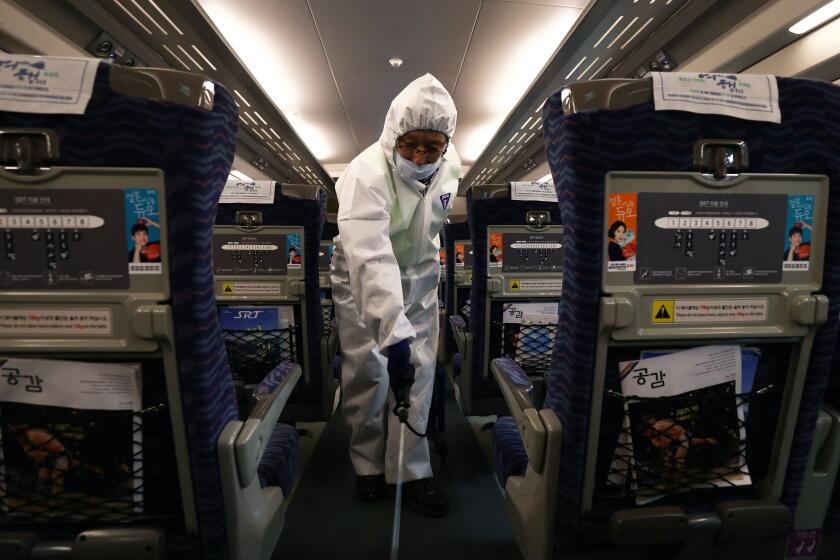The Silent Book Club, a global meet-up for introverts, now connects them remotely
- Share via
On March 21, two days after Gov. Gavin Newsom announced a statewide shelter-in-place order, 12 Californians, myself included, logged on to Skype to talk about what we were reading. “It sure does feel like we’re all living in a dystopian novel,” said our affable host, book blogger Kari Erickson. “Personally, I would’ve preferred a rom-com.” After introducing ourselves, we hit the mute button on our screens and read on our own for half an hour, together.
Welcome to Silent Book Club in the time of coronavirus.
Billed as a book club for people who don’t love book clubs, Silent Book Club has 262 volunteer-run chapters in 31 countries, including six in Los Angeles County. Before migrating online in advance of the COVID-19 pandemic, these monthly events have taken place in cute cafes, speakeasy-style bars, libraries and other public spaces.
A silent book club sounds like an oxymoron. Book clubs are opportunities to socialize around books. A book club where everyone reads quietly — isn’t that just a Starbucks? Not exactly. Silent book clubs have sought to do away with everything irksome about book clubs — mandatory readings, homework-shirkers, arguments over selections, potluck dishes — while retaining the sense of community, the love of books and in some cases the alcohol. The “silent” part refers only to the dedicated reading time (usually an hour). There’s conversation — a sharing of notes on individual reads rather than one assigned book — at beginning and end of each meeting. Or, in the past several weeks, a virtual meeting.
“I love the way that virtual meet-ups are broadening and redefining our community,” says Silent Book Club co-founder Guinevere de La Mare, a UX writer at Google who previously worked in marketing at Chronicle Books. “Reading books together online has provided a welcome respite from endlessly refreshing the news.”
The introvert-friendly club grew out of small events De la Mare organized in San Francisco with Laura Gluhanich, the director of programs at the nonprofit Him for Her. They coined the name and began expanding in 2012 — and today they are truly global. De la Mare recently attended two online Italian chapter meetings of the Silent Book Club, in Genoa and Turin, something she’d never been able to do before coronavirus spread.
Governments and health officials around the world are trying to mitigate the spread of the coronavirus outbreak.
“What’s been most surprising is how universal this is,” she says of the low pressure, low friction meet-ups, adding that the book club “spans age, gender, culture, and religion” and often spawns discussions that go far beyond books. Brunch plans and friendships quickly follow.
As Italy’s health crisis exploded, De la Mare kept in close touch with the Turin organizers. Weeks before the pandemic hit the U.S. in earnest, it felt “totally surreal,” she says, “but also inspiring to see this group of readers who were staying in and making the best of the situation. It paved the way for how we guided the rest of our chapters to handle the crisis.”
Orange County chapter organizer Divya Mirchandani had to cancel her standing Silent Book Club meeting at Newport Beach Public Library because of the coronavirus, but encouraged members to read for an hour on their own and post pictures of their books to the chapter’s Meetup.com page. Then, on March 21, eight members joined a Zoom video conference to discuss their reading.
“It was important for me not to cancel,” says Mirchandani, a corporate accounting CPA who heard about the club on Facebook in 2016. “Especially in a time when there is so much panic and outlets of interaction are being shut down, it becomes even more crucial to provide that safe sense of community.”
She says she will continue hosting online until shelter-in-place rules are lifted, but is eager to get back to the club’s roots: “So many things in our lives are already virtual. This is just a means to not let the community sense drift away; it will not be a replacement for the in-person meetings going forward.”
As a mostly introverted person who has been a member of several book clubs that fizzled due to scheduling issues or geography, I get the appeal of Silent Book Club. I work from home and read every day by myself. I often want to discuss the latest buzzy novel IRL or follow a recommendation not created by an algorithm.
When I join the welcoming Los Angeles chapter from my home office, I immediately sense I am among my people. It’s a relief to talk about something other than ventilator shortages and skyrocketing unemployment.
Those in attendance today include history teacher Trish Vale, who’s reading “Eighty Days,” about Nellie Bly and Elizabeth Bisland’s race around the world. “It’s nice to be held accountable to read,” she says to the group. “I couldn’t see what was going on with my phone.” Other heads on my screen nod in agreement from their squares.
Dani Dutta, a case manager at a social service agency wearing pajamas in bed, brought Kwana Jackson’s contemporary romance “Real Men Knit.” Gillian Kane shares Sarah J. Maas’ fantasy novel “House of Earth and Blood” with the group. “Silent Book Club has been the joy of my month because I don’t get out much,” says Kane, a transplant from New York. “I’ve only been in California for a year, so this was a good way to try to meet people.”
Adam and Carly Greenlee sign on to Skype with their 1-month-old son Gregory and a pair of nonfiction tomes: Thomas Piketty’s “Capital in the Twenty-First Century” for him, Erik Larson’s latest history, “The Splendid and the Vile,” for her.
“These meetings are generally female heavy,” says Adam, who works in digital marketing and is the only man in the group today. “We’ve told some of my guy friends, ‘You should join because you might meet someone.’” Carly, who is on maternity leave from her job as a pricing manager at AT&T, likes the virtual format: “I could take a break and feed [the baby] and now he’s fast asleep.”
Authors like Lionel Shriver, Alexander McCall Smith, Laura Lippman and Steph Cha are under coronavirus quarantine too. Here’s what they’re reading.
As I suspected, reading together in front of my webcam feels awkward at first. But when I sneak a furtive glance at my screen, everyone is so engrossed in their own books that I feel compelled to focus on my own (George Saunders’ Booker Prize-winning novel, “Lincoln in the Bardo”). The time flies by, and without any distractions, the reading somehow feels even more untethered from the virtual world than it would in regular quarantine. Once the 30 minutes are up, our host makes a quiet announcement so as not to scare us out of our reveries.
We spend a few minutes describing each of our books and letting the group know how we’re enjoying them so far. Someone mentions that the Kindle version of K.A. Tucker’s “The Simple Wild” is on sale for $1.99 and shares a tip about continuous scrolling. The group concurs that it’s still important to meet virtually.
Erickson, who typically hosts meetings at Bricks & Scones in Larchmont Village or Teapop in North Hollywood, sums up how we’re all feeling: “It’s easy to stay inside and kind of hibernate, especially now that we aren’t supposed to go anywhere, but I think it’s still important to have social interaction.”
Although today’s group members are strangers to me, leaving them feels a bit melancholy. I can tell that this book club for introverts is servicing a deep-seated desire for communication with others. A few attendees appear hesitant to leave the call, unsure how to say goodbye in this new world without handshakes or hugs. Instead, we simply wave to one another, hopeful that we can do this again sometime, in real life or otherwise.
Namkung is the author, most recently, of “These Violent Delights.”
In a virtual meet-up, “Almost Home” author Fanny Singer and mother and famed chef Alice Waters join book club readers April 21 for a kitchen conversation.
More to Read
Sign up for our Book Club newsletter
Get the latest news, events and more from the Los Angeles Times Book Club, and help us get L.A. reading and talking.
You may occasionally receive promotional content from the Los Angeles Times.










